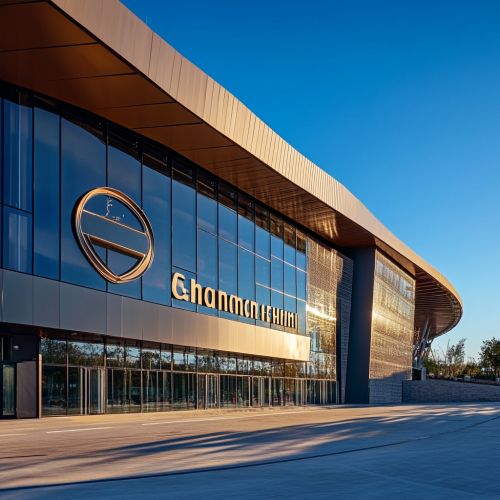History of Arsenal F.C.: Difference between revisions
(Created page with "== Early History and Formation == Arsenal Football Club, commonly referred to as Arsenal F.C., was founded in 1886 in Woolwich, South East London, by a group of munitions workers from the Royal Arsenal. The club was initially named Dial Square, after a workshop at the heart of the Royal Arsenal complex. Shortly after, the club was renamed Royal Arsenal. In 1891, it became the first southern club to turn professional, changing its name to Woolwich Arsenal. The club join...") |
No edit summary |
||
| Line 25: | Line 25: | ||
== The Arsène Wenger Era == | == The Arsène Wenger Era == | ||
[[Image:Detail-99483.jpg|thumb|center|Exterior view of a modern football stadium with Arsenal F.C. branding.|class=only_on_mobile]] | |||
[[Image:Detail-99484.jpg|thumb|center|Exterior view of a modern football stadium with Arsenal F.C. branding.|class=only_on_desktop]] | |||
Arsène Wenger's appointment in 1996 marked a new chapter in Arsenal's history. Wenger introduced a more attacking style of play and emphasized sports science and nutrition. His tenure saw the club win three Premier League titles and seven FA Cups. The 2003-04 season was particularly notable, as Arsenal went unbeaten in the league, earning the nickname "The Invincibles." | Arsène Wenger's appointment in 1996 marked a new chapter in Arsenal's history. Wenger introduced a more attacking style of play and emphasized sports science and nutrition. His tenure saw the club win three Premier League titles and seven FA Cups. The 2003-04 season was particularly notable, as Arsenal went unbeaten in the league, earning the nickname "The Invincibles." | ||
Latest revision as of 13:08, 30 October 2024
Early History and Formation
Arsenal Football Club, commonly referred to as Arsenal F.C., was founded in 1886 in Woolwich, South East London, by a group of munitions workers from the Royal Arsenal. The club was initially named Dial Square, after a workshop at the heart of the Royal Arsenal complex. Shortly after, the club was renamed Royal Arsenal. In 1891, it became the first southern club to turn professional, changing its name to Woolwich Arsenal.
The club joined the Football League in 1893, initially playing in the Second Division. Arsenal's early years were marked by financial difficulties and modest success on the pitch. In 1913, the club moved to Highbury, North London, and dropped "Woolwich" from its name, becoming simply Arsenal F.C.
The Herbert Chapman Era
Herbert Chapman, appointed manager in 1925, is often credited with transforming Arsenal into a dominant force in English football. Chapman introduced innovative tactics, including the WM formation, and emphasized physical fitness and strategic planning. Under his leadership, Arsenal won their first major trophy, the FA Cup, in 1930, followed by their first league title in 1931.
Chapman's influence extended beyond the pitch; he advocated for the introduction of floodlights and numbered shirts, and was instrumental in the renaming of the local Tube station to "Arsenal," the only station named after a football club.
Dominance in the 1930s
The 1930s were a golden era for Arsenal, who won five First Division titles and two FA Cups. Key players during this period included Cliff Bastin, Alex James, and Eddie Hapgood. The club's success was built on a strong defense and a potent attack, embodying Chapman's vision even after his untimely death in 1934.
Arsenal's dominance was briefly interrupted by World War II, during which competitive football was suspended. The club played friendly matches and participated in wartime leagues, maintaining their competitive edge.
Post-War Challenges and Revival
After the war, Arsenal struggled to regain their pre-war form. The club won the league in 1948 and 1953, but the following decades were marked by inconsistency. The appointment of Bertie Mee as manager in 1966 heralded a new era of success. Under Mee, Arsenal won the Inter-Cities Fairs Cup in 1970 and achieved a historic league and FA Cup double in 1971.
The 1980s were a period of transition, with the club winning the FA Cup in 1979 but facing challenges in the league. The appointment of George Graham as manager in 1986 revitalized Arsenal, leading to league titles in 1989 and 1991, and a famous victory in the 1994 European Cup Winners' Cup.
The Arsène Wenger Era


Arsène Wenger's appointment in 1996 marked a new chapter in Arsenal's history. Wenger introduced a more attacking style of play and emphasized sports science and nutrition. His tenure saw the club win three Premier League titles and seven FA Cups. The 2003-04 season was particularly notable, as Arsenal went unbeaten in the league, earning the nickname "The Invincibles."
Wenger also oversaw the club's move from Highbury to the Emirates Stadium in 2006, a significant step in Arsenal's modernization. Despite financial constraints, Wenger maintained Arsenal's competitive status, consistently qualifying for the UEFA Champions League.
Recent Developments
Post-Wenger, Arsenal has experienced a period of rebuilding. The club appointed Unai Emery in 2018, followed by Mikel Arteta in 2019. Arteta, a former Arsenal player, has focused on developing young talent and instilling a strong team ethos. Under his management, Arsenal won the FA Cup in 2020, signaling a potential return to form.
Arsenal's recent strategy has involved a blend of experienced players and promising youth, aiming to compete at the highest levels both domestically and in Europe. The club continues to invest in its infrastructure and global fanbase, maintaining its status as one of the most storied clubs in English football.
